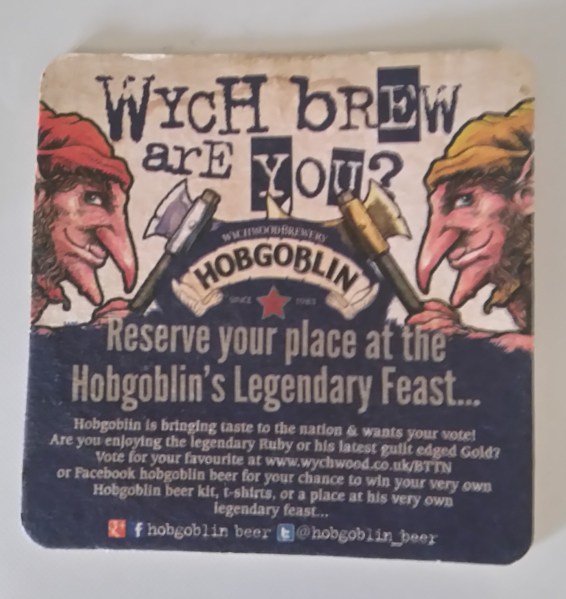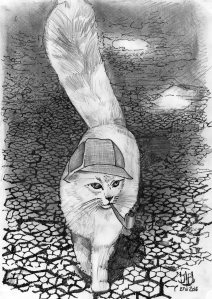L T Hardy on Rear Garden
‘He could foresee the end of the human race. Their downfall would be an obsession with staring at screens. All cats had to do was wait. They would take over…one living room at a time. One day, the world would be theirs. And people would just look on from their screens.’
Rear Garden, The Cat Who Knew Too Much
Behind the cheerful and modest York suburb of Acomb, lies a dark tale of murder and deceit. Its residents, unaware of the gruesome crimes that happen behind its semi-detached doors, in its mostly well-trimmed gardens and on the streets looked out on by almost clean windows.
Theodore is the large grey cat who loves tuna as much as he loves solving crimes that humans don’t see until right in front of their faces. Theodore’s new home transforms into the front-room window periphery of gory killings by an unlikely force of evil. Barrie’s feline protagonist is not without his own furry flaws: judgmental and callous to all except his owner, playing to the stereotype of a cat: mean and indescribably self-centred.
Theodore binds the human characters together in truthful exploration of suburban lifestyle; indeed, if he were able to talk the case would be cracked immediately. Through characterisations of locals only found up north and vivid location description, you find yourself in a front room donned with cat fur and DVD cases of Alfred Hitchcock movies. staring out the window into the window behind, questioning what is hidden away in the everyday life.
Rear Garden, with no shortage of humour or literary skill, provides both amusing and terrifying snapshots of what truly goes on in your next door neighbour’s, all with a condescending, obnoxious feline by your side.
I have the pleasure of knowing James through a job I had in the very suburb of Acomb where his text is set, coming together through shared love of authors, music and popular culture. He is an individual rare to come by in today’s world. His insightful recommendations and brilliant yet questionable puns are a powerful inspiration to a young writer like myself. I implore everyone to read Rear Garden and the rest of the series, if not for James, do it for your burning love or seething hatred of cats.
———————————————————————————————————————————-
L T Hardy is an English Literature student at York University. He is also an essential worker at the local supermarket where I buy my wine. J B
The Call of the Cat Basket
The new York Cat Crime Mystery is published on November the 5th. The date is no coincidence. The book is set on Bonfire Day & Night.
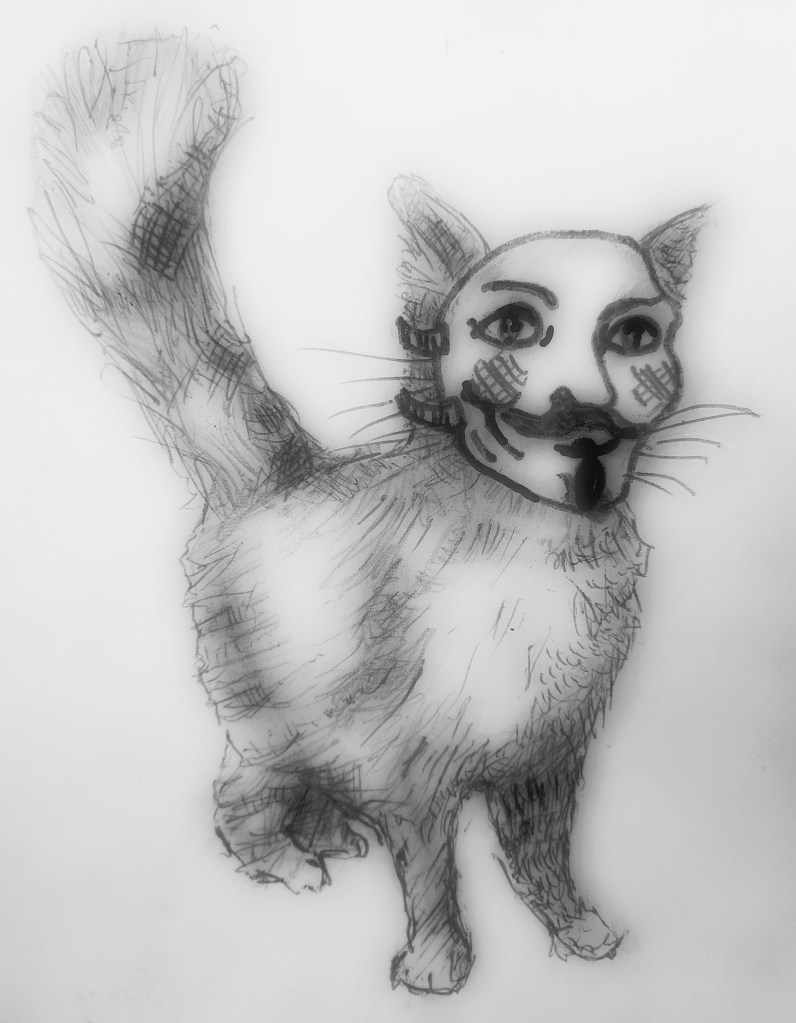
The first chapter is presented below.
Theodore did not read the newspapers, or he would have known that trouble was brewing, not alone for himself, but for every home-dwelling creature, fat or thin, hairy or furry, from New Earswick to Middlethorpe.
A protest march was planned for the city of York. Members of an anonymous anarchist group, who hid their faces behind Guy Fawkes masks, planned to descend on the city to protest about the government and the state of the nation. They were to be joined by several other groups: environmental protestors, students against fees, old people against death, cow welfare activists, badger cull protestors, members of a Radiohead Facebook group… You name it – they were descending on York in their thousands.
Theodore didn’t like to think too much of the greater concerns of the human world, if he could help it. He was beyond caring. As long as he had food in his bowl and a warm place to sleep, he was perfectly happy. Happy to be unaware. If only humans took the same view, the world would be a better place. He yawned with sleepy satisfaction. Then something hit him on the head.
He opened his eyes and glared at the dirty nappy that was inches from his head. He sniffed the offending parcel. It smelled of human waste. Baby waste to be precise.
‘Sorry, Theo,’ Emily said, fastening the poppers on Joseph’s babygrow. ‘Didn’t see you down there.’
Theodore looked up. Emily had just finished changing the baby, although Theodore preferred to refer to it as the Pink Hairless Interloper. He got to his paws and voiced his disapproval.
‘Come on. It didn’t hurt. We all have to poo, don’t we now?’
Perhaps it’s time you taught it to go outside, Theodore thought back.
Emily’s attentions returned to the baby. ‘You like tickles on the tummy,’ she said, and Theodore heard the Pink Hairless Interloper giggle.
‘You like that, don’t you… don’t you, Joey?’
And the Pink Hairless Interloper giggled again.
I think I’ll go downstairs, Theodore thought. There might be more intelligent forms of life down there.
Unfortunately there was just Jonathan, who was staring blankly at the television in the kitchen, a mug of tea in his hand. He was watching the news, as if it mattered; as if what was going on in the wider world was actually going to affect his existence. Why couldn’t I have had less ordinary humans? Theodore wondered.
Theodore padded past him and checked out the food bowl situation. His food had not been replenished since the night before. Even his water bowl did not have a cat’s whisker of water in it.
He miaowed at his bowls.
‘Shush,’ Jonathan said, not looking away from the television. ‘You’ll get fed as soon as Emily comes down.’
Jonathan knew that cats don’t miaow at other cats. Like human babies, they just use their undeveloped vocal cords to whine and bleat for food or drink from adult humans. They probably picked it up from human babies.
Theodore looked up at the television.
‘In other news today,’ the newsreader said, ‘a cat has been found in a child’s packed lunch bag on a roundabout in Tang Hall, York. A passer-by heard the cat’s cries and came to its rescue. It is now being cared for by the York branch of the Cats Protection League.’
Theodore’s ears flattened against his head. Best to stay indoors, Theodore thought, glancing at his cat flap. Bad things happen outside.
He looked over at his cat basket in the corner by the radiator. Bad things happen outside, the cat basket agreed. As soon as you’ve had your breakfast, you come for a nice long nap. A good eight hour snooze will set you up nicely for the day.
Theodore’s internal monologue was interrupted by the television newsreader in the corner of the room.
‘We have news just in… Milton Macavity, a convicted murderer, also known as ‘The Napoleon of Crime,’ is on the run from prison following a dramatic escape. Macavity was transferred to York Hospital early this morning, when it appears he faked an acute appendicitis.
‘Before going into the theatre for an emergency operation, he overpowered two prison guards and assaulted several people, including hospital staff and members of the public, before leaving the hospital on foot, wearing only a surgical gown. The police have warned the public not to approach the ginger-haired man, but to phone them and report it immediately. He has a history of violent behaviour…’
‘That’s only a stone’s throw away from us,’ Jonathan said. He picked up his mug and had a drink of Yorkshire Gold (‘a blend of 3 leaf origins from the top 10 tea gardens in the world’). ‘An escaped convict in the neighbourhood… Whatever next?’
Whatever, Theodore thought. We should never have moved to Haxby Road. I think I might have said so at the time. Next?
He approached the cat flap and stared through the rectangle of clear plastic, as a precaution to exiting.
A clothes line was hung across the yard. On it there was a row of babygrows, bibs, tiny pairs of socks and then a mixture of Emily’s and Jonathan’s clothes. The air was damp and there was no breeze. Rather optimistic, thought Theodore.
Then a pink-faced man with short ginger hair and ginger stubble appeared. He was wearing only a hospital gown. It must be the escaped convict: Milton Macavity, Theodore deduced.
The man turned his back to the house, exposing a pair of dirty grey boxer shorts. He cast off the hospital gown and tossed it into the corner of the yard. He snatched a pair of black jeans from the line and began to put them on.
Theodore turned and miaowed that Milton Macavity, convicted murderer and escaped convict, was in the back yard stealing a pair of Jonathan’s jeans.
Jonathan turned away from the television for a moment. ‘You’ve got a cat flap,’ he said. ‘Use it.’
Theodore turned once more to the cat flap. Milton was now putting on Jonathan’s red and black checked shirt. Theodore announced the latest development.
This time Jonathan didn’t even turn round. He just said, ‘I’m not going to get up and open the door. Just use the cat flap like any reasonable cat.’
Theodore looked back through the cat flap.
Milton was putting on a pair of light blue and dark blue hooped rugby socks.
Then came the voice from behind him. Why would you want to go outside? You don’t want to go chasing escaped convicts, now do you?
Theodore turned round and looked back at his cat basket. It was positioned in front of the radiator. It was brown and furry with the roof stretching over to form a warm cocoon. One of Emily’s old woollen jumpers lay in the bottom. Theodore had managed to knead the jumper to the point that she could wear it no longer and he had then inherited it. From the basket he could survey his food bowls, the cat flap and also any activity in the kitchen: the epicentre of the house. His cat basket was the perfect place.
Humans spend too much time looking for perfect places. Moving houses in the hope of happier lives. Expensive holidays in exotic locations. Retreats in remote wildernesses… They had yet to realise that the perfect place was a warm furry cave by a radiator. Life is oh-so-simple, if only you let it be.
Theodore blinked his eyes. He turned back to the cat flap.
Milton was wearing Jonathan’s shirt, jeans and socks. The escaped convict looked down at his stockinged feet and the wet grass and shook his head. He didn’t have any shoes, Theodore realised.
Then came the voice in his head again. Just let it go, it said. They’re just clothes. Who needs clothes after all? You come and have a sleep. This jumper is so soft. When you wake, everything will be just fine…
Theodore knew he had to resist the call of the cat basket. There was an escaped convict in his yard, who had stolen half of Jonathan’s wardrobe. He needed to take up the pursuit of this escaped convict. He nosed open the cat flap.
You don’t want to go outside, came the voice again. Bad things happen out there.
Oh, be quiet, Theodore thought, silencing the voice in his head. He pushed his head and then his body through the rectangular opening. With a snap, the cat flap shut behind him.
Milton was standing just a few yards away. He spotted the big grey fluffy cat. He caught the cat’s eye and placed a forefinger to his lips.
Theodore decided it would be wise to hold still his throat and not call out the alarm.
Milton walked over to the boundary wall. He jumped over it into the next yard.
Theodore padded over to where Milton had thrown the hospital gown. He sniffed it. It smelled of Old Spice deodorant and stale sweat. Theodore inhaled the odour, committing it to memory.
He glanced back at the house. From upstairs, he could hear the Pink Hairless Interloper squealing. From the kitchen he could hear the muted outpourings of the television. He miaowed at the house.
You know you don’t want to leave the comforts of home, the cat basket called back. Inside is good; outside is bad. Bad things happen out there…
He looked at the side wall, over which Milton had vaulted. Then he looked back at his own house. He was going to have to go it alone.
His tail raised up behind him, Theodore set off after Milton. He jumped up on top of the boundary wall and looked across at the rows of backyards separated by red brick walls. Milton was nowhere to be seen.
Theodore sniffed the damp autumn air. There was the faint smell of smoke; the smell of used nappies in the outside bin, moulding leaves in gutters, car exhaust fumes and the scent of urine sprayed by a neighbouring cat. But he could not pick out Milton’s smell and from that the direction which he had taken.
You can still come back, the cat basket called. It’s warm by the radiator. You can forget what you’ve seen. You can sleep away the day. You can dream beautiful dreams…
And Theodore did consider giving in to the voice and returning to the furry cave by the radiator. His perfect place.
But then he heard voices. Raised voices…
Theodore jumped down into the next yard and then up onto the next wall, following the voices. He hurdled several boundary walls.
You really don’t want to do that, came the voice, fainter now.
But Theodore’s ears were pricked back and his
tail was standing up straight. He was in hot pursuit. His next case had begun.
A Dinner Date with J.L. Carr
Our friend John Wheatcroft, journalist and novelist, has written a piece about J.L. Carr, based on his meeting the author and publisher in the 1990s and later his son Bob Carr in 2007. Here we reproduce his article and tip our hats to the Carrs and the Quince Tree Press: purveyors of fine books, pamphlets and county maps…
Bob Carr is both touched and surprised by the affection in which his novelist father is still held.But he nearly fell over when he learned that his dad, J L Carr, had once prepared a three-course meal for a complete stranger.
Carr junior came up from Suffolk in 2007 to visit South Milford in North Yorkshire, where his father had once taught in the local primary school. Villagers were holding a week-long celebration of J L (Jim) Carr’s life, culminating in the opening of a ‘Reflective Garden’, complete with a sculpture dedicated to the writer. My anecdote was one of many Bob listened to patiently during the evening, and it was evidently the most unexpected.
James Lloyd Carr died in 1994. The year before, I had been visiting a friend in Northamptonshire when I realised that I was close to his home. I phoned and asked if I could meet him. Carr, though baffled as to why I should wish to do so, agreed and suggested lunch the following day at his house in a suburb of Kettering.
I arrived with a bottle of New Zealand sauvignon, which was placed gingerly in a cupboard. Ten years later, when reading Byron Rogers’ brilliant biography, The Last Englishman, I learned that Carr, not a great drinker, once handled a gift of a bottle of whisky as if it might explode. The hearty three-course meal that he provided for me – soup, steak and kidney pie and jam roly-poly – wouldn’t have been out of place in a 1950s’ Lyons’ restaurant.
His twin obsessions were writing – he was full of praise for Nick Hornby’s Fever Pitch which he had reviewed for a national newspaper – and anything to do with Yorkshire. When I told him that my sister lived in Womersley, a village near Pontefract, he rushed off to find an atlas.
He asked me if I did much writing and seemed desperate to deter me from pursuing it. Many young writers, he said, are too eager to get into print and need to experience more of life first.
I was almost 40 at the time but, I suppose, a spring chicken in the eyes of a man whose first book was nominated for the Booker Prize several decades after he started work on it. Carr made the Booker shortlist (for the second time) in 1985, with The Battle of Pollocks Crossing, when he was 73.
A few things had happened in the intervening years, of course. Carr worked as a teacher, latterly as a primary school head, until 1967. He then set up as a publisher in his spare bedroom, drawing and selling maps of the English counties. He also produced little dictionaries and tiny volumes (many are still available) about the great poets. His eccentric Dictionary of Extra-Ordinary English Cricketers (1977), which was republished in an expanded, hardback form by Aurum Press in 2005, was a great success. It omits Sir Donald Bradman but includes Max Beerbohm who subscribed a shilling to W G Grace’s
funeral ‘not in support of cricket but as an earnest protest against golf’.
Carr also had several novels published (all after he passed 50) to critical acclaim but modest sales.
He said: “The book that became Pollocks Crossing was deservedly turned down many, many times under different titles. Finally I put it away until I’d published five other novels. Then I wrote it again in cold blood.”
That phrase came up again and again. Carr saw writing as a craft; the novelist had to take account of what publisher and public want.
The word that springs to mind to describe his novels is idiosyncratic. They’re old- fashioned, in the sense that the virtues of character and narrative are important, but quite different from one another: How Steeple Sinderby Wanderers Won the FA Cup (not sponsored by Budweiser of the Emirates) is a comic account of a village football team’s progress to Wembley. A Month in the Country, also shortlisted for the Booker, is a nostalgic idyll set in a gloriously hot summer after World War One. That was the moment, he reckons, when his commercial instinct served him best.
He said: “Most people like reading about the past, life seemed more leisurely before the motor car age. They like a love story without too much sex – in any case people of my generation are very reticent about sex. And people like hot weather. If incorporating those elements is not a cold-blooded approach, I don’t know what is.”
Carr’s love of design work and his commercial ‘nous’ came in handy when he was offered what he described as ‘a disappointing advance fee’ for his 1988 novel, What Hetty Did. He decided to go it alone, publishing through his own Quince Tree Press ‘a superior looking book’. After three editions and 8,000 sales he had made a handsome profit, encouraging him to buy back the licences for most of his other works and to publish them himself.
He told me that he expected A Month in the Country to survive (“after all, it’s an examination book now, people are having to read it”) but felt that otherwise his desire to please counted against him.
“I’m rather a specialist taste. If you really want to make a big reputation as a writer you need to keep on working in the same genre. If you chop and change, as I’ve done, you’ll lose readers as well as gain them.”
Perhaps posterity will prove Carr to be wrong. In The Ordeal of Gilbert Pinfold, Evelyn Waugh offers a summary of his protagonist’s literary credentials. Pinfold’s writing, he says, might be seen in 100 years’ time as typical of a generation of novelists ‘notable for elegance and variety of contrivance’.
That could well serve as a summary of Carr’s literary output. In a couple of generations’ time, when we’ve tired of some of the more meretricious contemporary heavyweights, Carr might just be still with us.
Meanwhile, Bob Carr keeps the flag flying, continuing to sell his dad’s books under the Quince Tree Press imprint (www.quincetreepress.co.uk) and to marvel at his popularity and previously unearthed talents in the kitchen.
John Wheatcroft’s novel Here in the Cull Valley, published by Stairwell Books, is available online….
Ten Things You Probably Didn’t Know About Acomb
You may think that Acomb is one of the lesser interesting parts of York, but delve beneath the surface and you may come across some interesting facts. Here are ten things that you may or may not know about York’s largest suburb.
- The name Acomb most likely comes from the Old English Acum meaning ‘At the oaks’. This suggests that Acomb was once wooded. The original village has since grown to have a population of over 20,000 people. From little acorns do mighty oaks grow, as they say.
- History tells us that Septimus Severus’s body was burned on a pyre on Severus Hill in Acomb. Septimus Severus was a Roman Emperor, who died in York in AD211. Today his influence can be seen in the street names Severus Street and Severus Avenue. Nobody seems to know for sure where Severus Hill is actually located but my hunch is that there is a water tower built on top of it these days.
- Acomb House is situated opposite the entrance to Morrisons supermarket. In the nineteenth century Canon Raine exposed a Roman mosaic in his back garden. He quickly covered it up again and would not let anyone know its precise location for fear that it would be removed. One wonders if it will ever see the light of day again.
- Alfred Lord Tennyson, the royal poet laureate for most of the nineteenth century, had a brother called Edward. The unfortunate Edward was institutionalised in Acomb Asylum the whole of his adult life until his death in 1890. His grave can be found in St Stephen’s graveyard.
- Acomb Green was once a giant sand pit, that’s why it’s cut into the hillside. ‘Acomb Sandhole’ provided fine sand for sale to the local builders. It may well be present in the mortar holding your house together.
- Acomb did not become part of the City of York until 1937. Before then it was part of West Yorkshire.
- The 1930s Regent Building on York Road, now home to the present-day Co-op and other businesses, was a cinema until the 1950s. It could seat almost 900 people. It opened on 12 February 1934 with Maurice Chevalier in A Bedtime Story and closed on 4 April 1959 with Sierra Baron. Anecdotal evidence suggests it was shut down due to rowdy teenagers, both inside and outside the cinema.
- The Acomb Stakes is a horse race that takes place in August every year at York Racecourse, presently on the first day of the Ebor Festival. The seven-furlong flat race takes its name after the York suburb.
- Acomb has a namesake in Northumberland, located to the north of Hexham. This other Acomb is a former mining village with a population of just 1,270.
- Acomb is home to York’s finest (fictional) feline sleuth: Theodore…
Rear Garden: The Cat Who Knew Too Much, the sequel to The First of Nine: The Case of the Clementhorpe Killer, is set in Acomb. While writing it I came across the above facts and many more.
By setting the novel in Acomb, I could explore what might lie beneath the surface of a seemingly ordinary suburb.
By having a cat as the central character, Theodore can access places denied to humans. He can pass through hedges into other people’s gardens without anybody batting an eye. He can peer through windows, carrying out undercover surveillance without the householder realizing. He can trail a suspect without arousing suspicion. Having a cat as a detective may not be as crazy as it might at first sound…
Rear Garden, like its predecessor The First of Nine, is a cat’s take on murder mystery. It’s cozy crime with claws!
Goodreads Author
Finally sorted out my Goodreads author page! Hurray!
 The First of Nine: The Case of the Clementhorpe Killer (A York Cat Crime Mystery Book 1)
The First of Nine: The Case of the Clementhorpe Killer (A York Cat Crime Mystery Book 1)
Rear Garden: The Cat Who Knew Too Much
The first chapter of the new Theodore book is below.
Welcome to God’s Own County
She takes a last drag on the cigarette and drops it from her bedroom window, down the gap between the house and the shed, like she has done a thousand times or more, but this time, rather than smouldering out with the rest of the butts, the shed explodes with a bang.
Her dad staggers out. He’s on fire. He stands in the middle of the lawn. He flaps his hands against his clothes, trying to put out the flames. He turns and faces the back of his house. He looks up at her bedroom window. ‘Hell,’ he shouts. ‘Hell fire!’
She is 14 years old. She has unicorns and princesses on her curtains, pink and blue. She has grown out of them but her dad has promised her new curtains, yellow ones. She wonders if she’ll get the yellow curtains now.
From the bedroom next to hers, she hears her sister scream. She is three years older, about to go off to university.
Then she sees her mum run outside, wet tea towels in her hands. ‘Get down on the lawn,’ her mum shouts at her dad.
Her dad lies down on the lawn and her mum pushes the wet tea towels against the flames and smouldering clothing. Her dad has stopped screaming and she knows he is dead. His mouth is open; his gums peeled back to show off his yellow teeth.
There is a corpse, with blackened, blistered skin, clothes burnt onto flesh, lying in the middle of the neatly trimmed lawn.
Her mum shakes out one of the tea towels. It is streaked with soot. She lays it over her dad’s face.
The tea towel has rolling green hills and winding blue streams on it, and bares the slogan: ‘Welcome to God’s Own County’.
************************************************************
Hitchcock, Ellis & De Palma – Notes on Source Material
Notes on source material for Rear Garden, or The Cat Who Knew Too Much (published March 2018)
Rear Garden took almost five years to write. The first few thousand words were written in the spring of 2013. I hit several garden walls and hedges. Life and other work got in the way. It was always at the back of my mind though and during these five years I watched many Hitchcock films and went back to the original novels or short stories that the films were based on, some more loosely that others.
Rear Window was based on a short story by Cornell Woolrich; Vertigo, a short novel by Boileau & Narcejac; The Birds, a short story by Daphne du Maurier, and Psycho from the novel by Robert Bloch. References to these works are scattered throughout Rear Garden, breadcrumbs cast onto a lawn.
I also reread American Psycho by Bret Easton Ellis. It was June 2017 and I was in New York City, visiting a friend. With several hours on buses ahead of us, I picked up Ellis’s book thinking it would at least pass the time on the bus. It was a time that I wished I had a wrapper over the book’s cover, so that people didn’t know what I was reading.
American Psycho only once directly references Hitchcock’s Psycho. Patrick Bateman, the antihero of Ellis’s book, tells a colleague: ‘… Janet Leigh was from Phoenix… She got stabbed in the shower. Disappointing scene… Blood looked fake.’
Perhaps Bateman’s dismissal of the film echoes Ellis’s own opinion. Bateman does love Brian de Palma’s 1980s’ film Body Double though. American Psycho mentions the film several times.
One brilliant example:
‘After more stretching exercises to cool down I take a quick hot shower and then head to the video store where I return two tapes I rented on Monday, She-Male Reformatory and Body Double, but I rerent Body Double because I want to watch it again tonight even though I know I won’t have time to masturbate over the scene where the woman is getting drilled to death by a power drill since I have a date with Courtney at seven-thirty at Café Luxembourg. ‘
Later in the book, Patrick returns to the video store:
‘Then, almost by rote, as if I’ve been programmed, I reach for Body Double – a movie I have rented thirty-seven times – and walk up to the counter where I wait for twenty minutes to be checked out by a dumpy girl (five pounds overweight, dry frizzy hair).
Patrick thinks, ‘the things I could do to this girl’s body with a hammer, the words I could carve into her with an ice pick.’
Patrick says to the check-out girl, ‘I like the part in Body Double where the woman… gets drilled by the… power driller… the best.’
I bought the DVD of Body Double when I got back to York, England. Brian de Palma described the film as ‘hardcore pornographic suspense’. It deals with themes including voyeurism and obsession. It is also a homage to the films of Hitchcock, particularly Vertigo, Rear Window and Psycho (the holy trinity of Hitchcock films).
The film was pummelled by critics on its release. Three weeks after its release, Columbia Pictures tore up Brian’s contract, painted over his car parking space and escorted him out of the building. As far as Columbia Pictures saw it, the film was a $10,000,000 fiasco.
Brian jumped into his car. He said to himself, ‘Holy mackerel!’ which is a favourite expression of his.
He then went on to make such great films as Carlito’s Way, The Untouchables, and Mission Impossible.
Body Double is admittedly not Brian’s greatest moment. The driller-killer scene echoes Hitchcock’s shower scene. But with Brian, we see a whole lot more. We see Melanie Griffith lying on the floor of her apartment. The bad guy is standing over her, the massive drill whining and whirring between his legs, before penetrating Griffith’s chest.
Holy mackerel!
Street Cats & Beer Mats
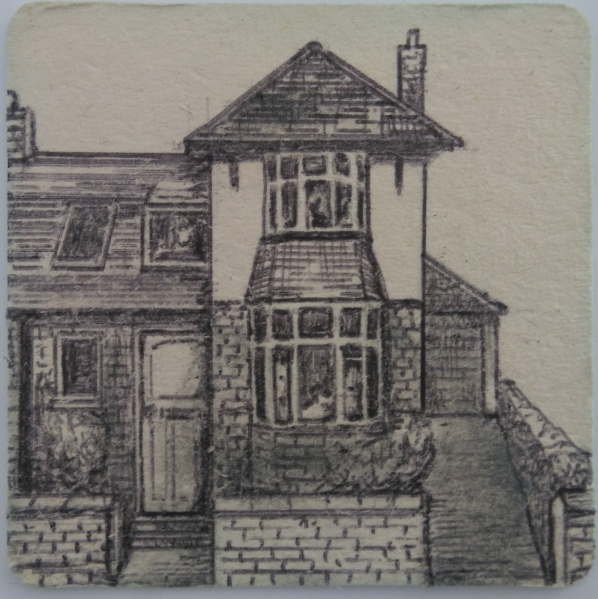
Executed in black biro and cigarette ash on the reverse of a Yorkshire Blonde (Ossett Brewery) beermat – Benalmedana Pueblo, Spain, March 2017.

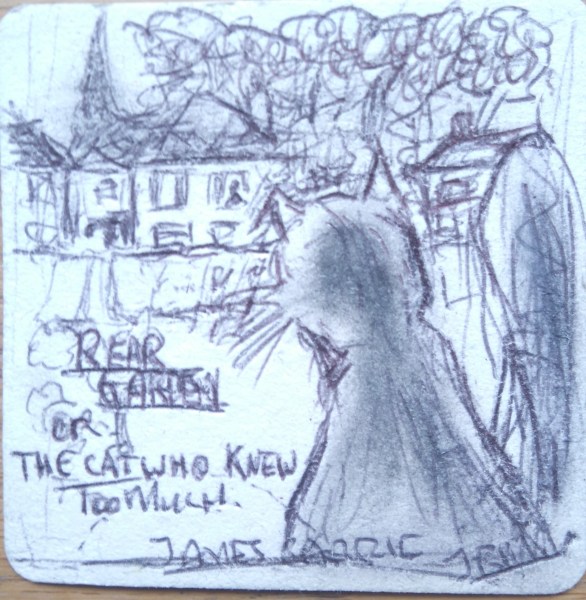
Black biro and cigarette ash, again on the back of a Yorkshire Blonde.
Rear Garden on the back of a Timothy Taylor Boltmaker beermat, executed in black and green biro, felt tip, and blue and green highlighter pen (Easter 2017, York). I think I might have overdone the colour, hence the B&W version.

Black biro on the back of a Hobgoblin beermat, swiped from The Sun Inn, Acomb, York. Probably sometime in 2015.
This was later developed over Easter 2016.
